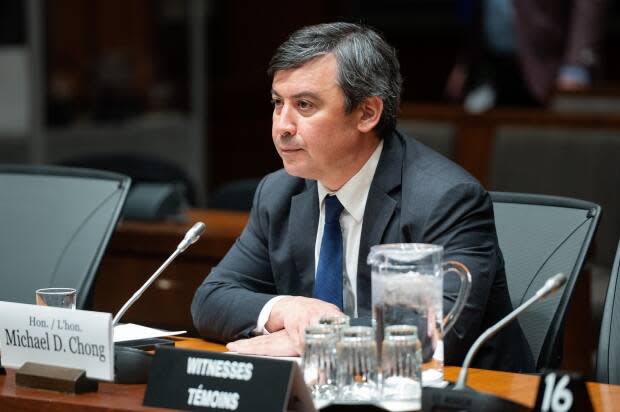Parliamentary committee agrees to take on probe of Winnipeg lab scandal

A parliamentary committee has agreed to question key witnesses about how two scientists studying deadly viruses at a special lab in Winnipeg were able to work closely and covertly with China.
Conservative MP Michael Chong brought forward a motion to the Canada-China committee Tuesday morning to study the recent release of federal documents related to the dismissal of two scientists — Dr. Xiangguo Qiu and her husband Keding Cheng — from the National Microbiology Lab.
As a Level 4 lab, the Winnipeg institution is cleared to work with some of the most dangerous pathogens in the world.
"I think it's really important that the government get its security policies right so that we don't see another national security breach like we saw at the Winnipeg lab," Chong said after the committee meeting Tuesday.
After a years-long fight over access to information about Qiu and Cheng, the federal government tabled hundreds of documents relating to the case last month. They showed that the Public Health Agency of Canada (PHAC) first became suspicious in September 2018 after Qiu had been listed as the inventor on a Chinese patent that might have contained scientific information produced in Canada.
That triggered a Canadian Security Intelligence Service (CSIS) review, which ultimately concluded Qiu had lied and was "intentionally" sharing scientific information and materials with China — potentially putting public health in jeopardy.
The intelligence service also said it believed Cheng was not truthful in his interviews and had worked with a restricted visitor at PHAC "who is connected to [China's] People's Liberation Army."
The couple were marched out of the facility in July 2019 and were stripped of their security clearances. Their dismissals were announced in January 2021, triggering concerns about Chinese espionage and leading to heated demands in Parliament for more information.
"The documents show that a flag went up in September 2018. We want to understand whether or not that was the first red flag that appeared in the government or if there were earlier red flags that went unheeded and unacted upon," said Chong.

"It took ten months for the government to secure the lab in Winnipeg. Why did it take so long for that to happen? What delayed the the flow of information within the government, the flow of intelligence within the government that prevented the lab from being secured earlier?"
As CBC News reported Tuesday, Canada is on the cusp of getting a second Level 4 lab. The University of Saskatchewan's Vaccine and Infectious Disease Organization (VIDO), home to Canada's Centre for Pandemic Research, is in the midst of renovations so it can handle human and animal pathogens.
"Surely, before we go down the path of of opening up a second Level 4 lab in Canada, we've got to make sure that processes and procedures are in place to protect national security," said Chong.
Chong's motion passed unanimously Tuesday with minor tweaks.
The approved motion calls on multiple players to take questions from committee members, including the head of departmental security at PHAC, CSIS director David Vigneault, the prime minister's national security adviser Nathalie Drouin and members of cabinet, including Health Minister Mark Holland and Public Safety Minister Dominic LeBlanc.
The RCMP has been investigating Qiu and Cheng since 2019.
According to reporting by The Globe and Mail, Qiu and Cheng are now working in China.


